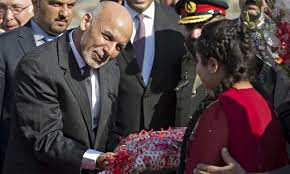
Islamabad, Nov 14: It has been a long time since Pakistan’s diplomats and politicians have truly looked forward to a visit from the president of Afghanistan. Senior officials who dealt with Hamid Karzai still shudder at the memory of a deeply mercurial man whose attitude towards Pakistan veered wildly between occasional spasms of warmth and long periods of outright hostility.
So the arrival in Islamabad on Friday of Karzai’s successor Ashraf Ghani making his first visit to Pakistan has triggered an outbreak of optimism. “There is a real desire among both the military and civilians to start a new chapter with Ghani,” said one diplomat. “In the end they all just found Karzai too difficult.”
There will be extensive opportunities to woo the new president during his two-day visit, during which he will join the Pakistani prime minister, Nawaz Sharif, in watching a cricket match between teams representing the two nations.
In recent weeks Pakistan’s de facto foreign minister, its army chief and its spy master have all visited Kabul carrying what were described as messages of support and cooperation. The army offered to help train Afghan soldiers and provide equipment for an entire infantry brigade.
But in a region wracked by terrorism and insecurity, fixing the fraught relationship between the two countries could reap far bigger dividends than just military training and matériel. Most experts believe that if the two feuding neighbours were to bury the hatchet, the chances of increased stability in the region would increase dramatically.
It is thought that Pakistan – if it wished – could push the Taliban towards a peace process that the international community has struggled with for years.
Pakistan’s undoubted influence over the Taliban is due to the fact that the insurgent group enjoys safe haven inside the country. The security establishment, despite Pakistan nominally being a US ally, has long been accused of covertly assisting the Taliban and other insurgent groups – most recently in an report by the US defence department.
Advertisement
Adding to the murk of the region’s so-called double game, in the last year Pakistan has publicly accused Afghanistan of also supporting terrorists. It says Kabul deliberately turned a blind eye to the presence of senior members of the Pakistani Taliban, an allied movement that aims to topple the Pakistani state, who are hiding in the Afghan borderlands.
Mushahid Hussain, a senator who takes a close interest in Afghan affairs, said: “With ‘fighting fatigue’ on either side of the Durand line [the disputed border between the two countries], both countries feel the need to grasp this new opportunity.”
Afghanistan has never accepted the Durand line, which in 1893 gave swaths of Afghan territory to the British empire – land that now lies inside Pakistan. The issue has soured relations ever since: Afghanistan tried to block Pakistan’s admission to the United Nations in 1947, and in the 1970s Kabul was particularly vocal in claiming its lost territory. That prompted Pakistan to train and arm anti-government Islamist groups in Afghanistan for the first time, a tactic that was later greatly increased in the 1980s and 1990s.
Even in recent years when there has been little serious discussion about redrawing borders, Islamabad has been repeatedly angered by Karzai’s attempts to present himself as a leader of Pakistani Pashtuns, the ethnic group that predominates in Afghanistan.
Pakistan’s worries are heightened by its anxiety that arch-enemy India is attempting to encircle it through its extensive diplomatic and development presence in Afghanistan.
Pakistan’s past attempts to get Afghanistan to heed its concerns triggered some of Karzai’s most bitter outbursts against a country that is deeply unpopular with ordinary Afghans.
Martine van Bijlert, an expert at the Afghanistan Analysts Network, said: “Ghani can be quite temperamental himself and also has a feel for populism. He may play this coolly and diplomatically, or much more emotionally.”
Despite the deep roots of an old conflict, Hussain said he was optimistic that things could improve, not least because China – Pakistan’s closest ally – is increasingly anxious for the decade-long insurgencies in Afghanistan and Pakistan to end. Beijing is worried about the threat from some of its own Islamist militants from the western province of Xinjiang currently fighting in the borderlands straddling the Durand line.
Moreover, Pakistan and Afghanistan are both faced with a fundamental new reality as the US withdraws troops from the region, said Hussain. “Islamabad and Kabul now realise that regional countries will have to largely fend for themselves, no longer banking on distant godfathers in Washington to pull their chestnuts out of the fire.”
